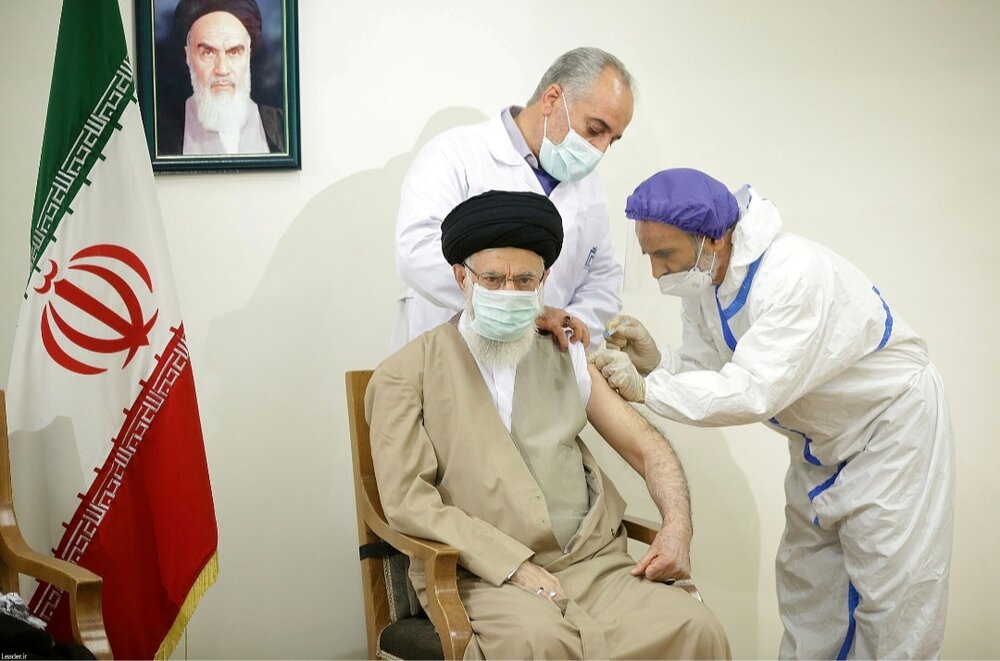National glory
Leader: I did not want to use non-Iranian vaccines, because we should respect this national honor.

TEHRAN – Leader of the Islamic Revolution Ayatollah Ali Khamenei received the first dose of the homegrown coronavirus vaccine (COVIRAN BAREKAT) on Friday, showing trust to domestic production and national capability.
Previously, Ayatollah Khamenei had set two conditions for him being vaccinated: first, that he would not receive the vaccination out of turn; second, that he would only receive an Iranian vaccine. For this reason, when the first phase of the vaccination of Iranians aged 80 and above started, he did not receive the foreign vaccine and waited for the Iranian one.
The Islamic Republic of Iran is the sixth country in the world and the first country in West Asia to gain the ability to produce the Coronavirus vaccine. Presently, there are several companies and centers researching and developing domestic vaccines. Due to the fact that two of the domestic vaccines have successfully passed the clinical, safety and efficacy trials, voluntarily receiving injections of them has started.
“I did not want to use non-Iranian vaccines, so I said I would wait for the Iranian vaccine,” he said. “Because we should respect this national honor. As long as there is a possibility of prevention and treatment inside the country, why shouldn’t we use it?”
“Of course, when needed, the use of foreign vaccines along with Iranian vaccines is not a problem, but we must respect the Iranian vaccine and thank all the young scientists who worked hard and actively in the production of this vaccine as well as other centers that are developing vaccines in the country,” the Leader added.
He also called on the Iranian vaccine producers to publishing the scientific results of the vaccines in international papers so that the world will be informed of the great achievements of the country.
With the outbreak of coronavirus, the competition began between countries for vaccine production; Iran was no exception making efforts to develop a vaccine against the virus and could eventually make it, being the first Islamic country and among the world's few vaccine manufacturers, the honor some advanced countries have not yet achieved.
Or even those few countries that started mass vaccination with their domestic vaccines, had come up with side effects and even mortality. While Iranian-made vaccines have so far reported no serious side effects, in addition to being highly effective against the virus, even against new mutants.
It was on June 21 that Health Minister Saeed Namaki announced that the Pastu Covac vaccine, coproduced by Cuba, has shown a 62 percent efficiency on new variants of coronavirus first emerged in South Africa and Brazil, 6 times more effective than the AstraZeneca vaccine.
Foreign vaccines banned into Iran
During his January 8 speech, Ayatollah Khamenei praised the Iranian-developed COVID-19 vaccine as “a source of pride,” underlining that no one should deny the breakthrough.
He also prohibited importing American and British vaccines due to their unreliable testing.
Ayatollah Khamenei pointed out that Iranian researchers have tested their vaccine on humans and they will develop an even better and more effective vaccine.
“Importing American and British vaccines into the country is forbidden. I have said this to officials and I am saying it publicly now. If the Americans had managed to produce a vaccine, this corona disaster would not have occurred in their own country.
If they know how to produce a vaccine and if their Pfizer company can produce a vaccine, why would they give it to us? Well, they can use it for themselves so that they will not have so many deaths and so many victims. The same is true of England. Therefore, they are not trustworthy. I do not really trust them,” the Leader stated.
Iranian-made vaccines enter the scene
Eleven countries from Asia and South America, and a European country have asked for importing Iranian-made coronavirus vaccine (COVIRAN BAREKAT), Hassan Jalili, the vaccine’s production manager, said on Wednesday.
“However, it is the Health Ministry that sets the policy for exporting vaccines,” he added, Tasnim reported.
Results of the second human trial phase showed that the vaccine creates immunity by 93.5 percent, he noted.
“We are preparing documents related to the vaccine to be sent to the World Health Organization once the third clinical phase is completed.”
Helping flourish medical tourism
Iran is one of the major destinations for health tourism in the region, and patients with 55 different nationalities, mostly from neighboring countries including Iraq, Kuwait, Bahrain, Qatar, Saudi Arabia, Oman, Pakistan, Afghanistan, Tajikistan, and Turkmenistan are seeking to use Iran’s services and facilities in this field.
Iranian hospitals admitted nearly 70,000 foreign patients over the Iranian calendar year 1397 (March 2018 – March 2019) and it made an economic contribution of around $1.2 billion to the country, according to the medical tourism department at the Ministry of Health.
The Islamic Republic has set its goals to exceed its yearly medical travelers to around 2 million in the Iranian calendar year 1404.
The development of over five different vaccines in Iran could flourish medical tourism more than before and can bring the country billions of foreign currencies.
FB/MG
Leave a Comment